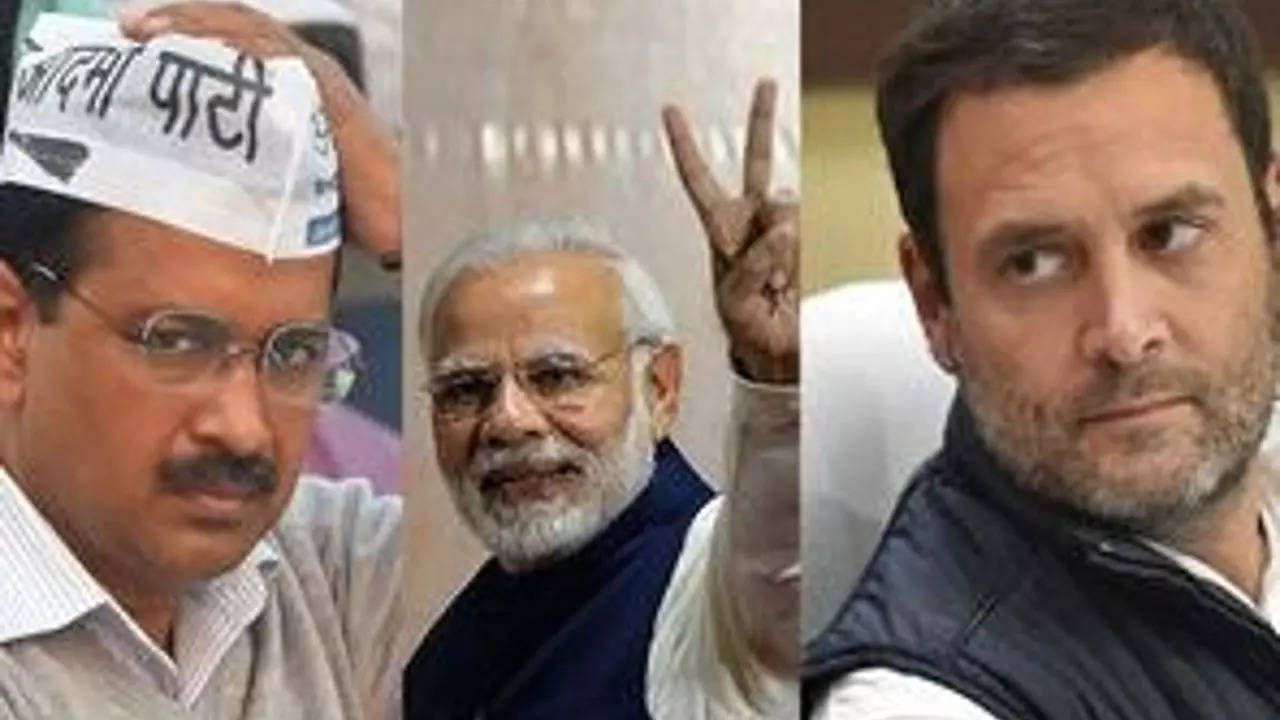
NEW DELHI: Having got accustomed to a bipolar contest among themselves in Gujarat, both the ruling BJP and the opposition Congress have ruled out a triangular fight despite the high voltage campaign by Delhi chief minister Arvind Kejriwal-led AAP in the forthcoming election in the state.
AAP supremo Kejriwal is trying to make the Gujarat assembly election into a contest between his party and the BJP. He has dismissed the Congress saying it would get “less than five seats”.
However, top leaders in both the BJP and the Congress are not ready to accept AAP as their main contender. They say the contest in Gujarat is between the BJP and the Congress.
There are subtle reasons behind the respective stands taken by BJP and Congress leaders vis-a-vis AAP.
BJP vs AAP
BJP leaders have reiterated that the contest is between their party and the Congress. Union home minister Amit Shah, who comes from the state, has on multiple occasions from different media platforms dismissed AAP and said that the state has always witnessed bipolar elections though they might have appeared like a triangular contest.
He said in the recent past Shankersinh Vaghela launched Rashtriya Janata Party (RJP) and Keshubhai Patel founded Gujarat Parivartan Party (GPP) after breaking away from the BJP.
RJP contested the 1998 assembly election to win only four seats. GPP fought the 2012 poll and was victorious on only two seats. Ratubhai Adani also launched his own party but in all three cases, the people of Gujarat voted for a two-way contest.
The only triangular contest took place when Chimanbhai Patel quit the Congress and formed his Janata Dal (U) which won 70 seats in the 1990 election. The BJP won 67 while the Congress bagged 33 seats. Chimanbhai first formed a government with the backing of the Congress. That government lasted just a few months. Later, he formed a government with the BJP’s support.
Out of 182 seats, the BJP won 99 seats in 2017 and 115 in the 2012 assembly election. The Congress won 77 in 2017 and 61 in the 2012 election.
The BJP is still considered to be strong in the urban assembly seats in Gujarat. Out of the total 182 seats, 42 are urban while the remaining 140 are rural seats.
The BJP won 36 out of 42 urban seats in the last election and 38 in the 2012 assembly election. On the other hand, the Congress won 6 seats in 2017 and 4 in 2012 in the urban areas.
Of the 140 rural seats, the Congress won 71 seats in 2017 and 57 in 2012. On the other hand, the BJP won 63 seats in 2017 and 77 in the 2012 assembly election.
AAP factor for BJP
AAP is generally considered an urban-centric party, particularly in Delhi and Gujarat. The BJP fears that the Kejriwal-led party, and not the Congress, might eat into its votes and harm it.
The BJP is already weaker than the Congress in the rural areas. But if it loses votes even in the urban areas, the situation might become threatening for the party in power in the state since 1995.
Secondly, AAP is positioning itself as a Hindutva party and as an alternative to the BJP. In order to woo Hindu voters away from the BJP, Kejriwal suggested printing pictures of Goddess Lakshmi and Lord Ganesh on Indian currency notes. He has also not condemned the release of convicts in the Bilkis Bano gangrape case.
This is the reason why the BJP is trying to run AAP down as a third force in Gujarat.
Congress vs AAP
The Congress party feels there is a massive anti-incumbency sentiment against the BJP government in Gujarat. The party feels the people have decided to vote the BJP out.
The Congress thinks it will get the advantage of the anti-incumbency sentiment. However, AAP’s entry has made it apprehensive.
The party does not want the anti-BJP votes to be divided between it and AAP. It wants to garner all the anti-BJP votes.
It feels some non-BJP parties have queered the pitch for it in recent elections, particularly in the Uttarakhand and Goa polls held earlier this year.
In Uttarakhand, the BJP won 47 of the 70 assembly seats by garnering 44.33 per cent vote share while the Congress got 19 seats and bagged 37.91 per cent votes.
The party feels AAP and Mayawati-led BSP put spanners in its chance of victory. AAP did not win any seat but got 3.31 per cent votes. BSP won 2 seats and got 4.82 per cent votes.
Together, AAP and BSP got 8.13 per cent votes. The Congress would have surpassed the BJP’s 44.33 per cent vote share had it not lost the anti-BJP votes to AAP and BSP.
Similarly in Goa, the BJP won 20 of the 40 assembly seats and 33.31 per cent of the vote. The Congress won 11 seats and got 23.46 per cent of vote share.
AAP won 2 seats and got 6.77 per cent of the vote while West Bengal chief minister Mamata Banerjee-led TMC could not open its account but it bagged 5.21 per cent of vote share.
Together, AAP and TMC garnered 11.98 per cent votes. The Congress’s vote share – and also seats – would have surpassed that of the BJP had it got those 11.98 per cent votes, party leaders feel.
The Congress does not want Uttarakhand or Goa to be repeated in Gujarat. Hence, it has taken a firm stand against AAP.
In the 2017 Gujarat assembly election, AAP contested on 29 seats and forfeited its deposit on all of them. It secured just 0.10 per cent of the vote share. However, both the BJP and the Congress are apprehensive that it might cut their votes in the forthcoming election.







